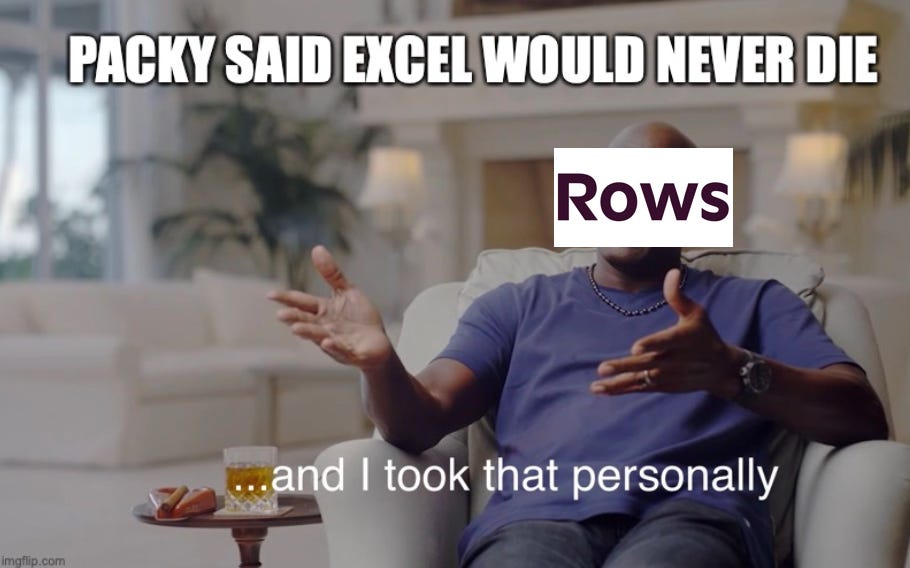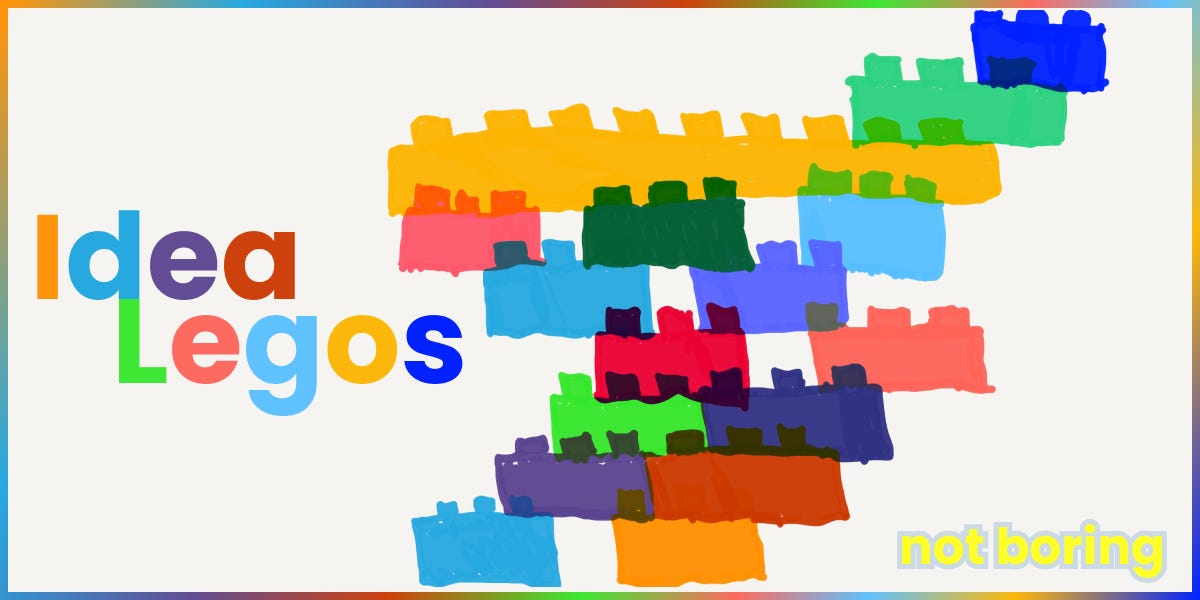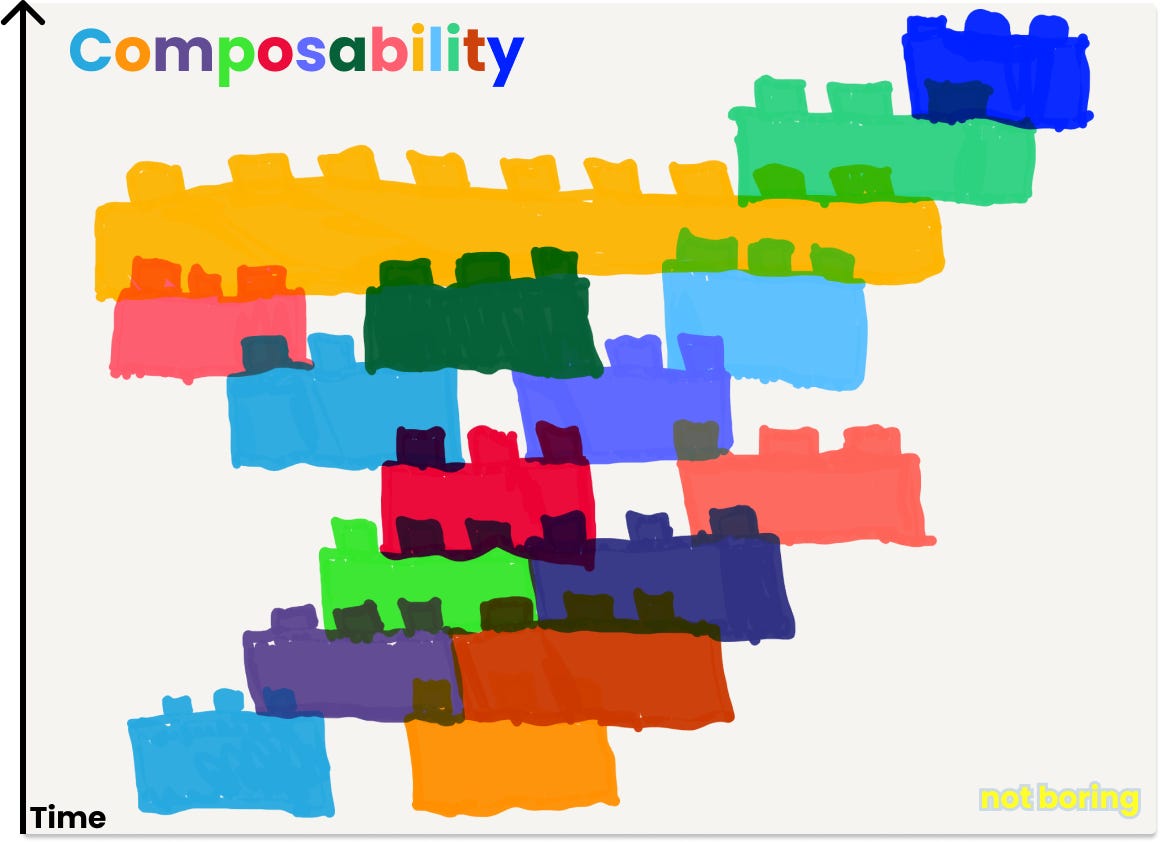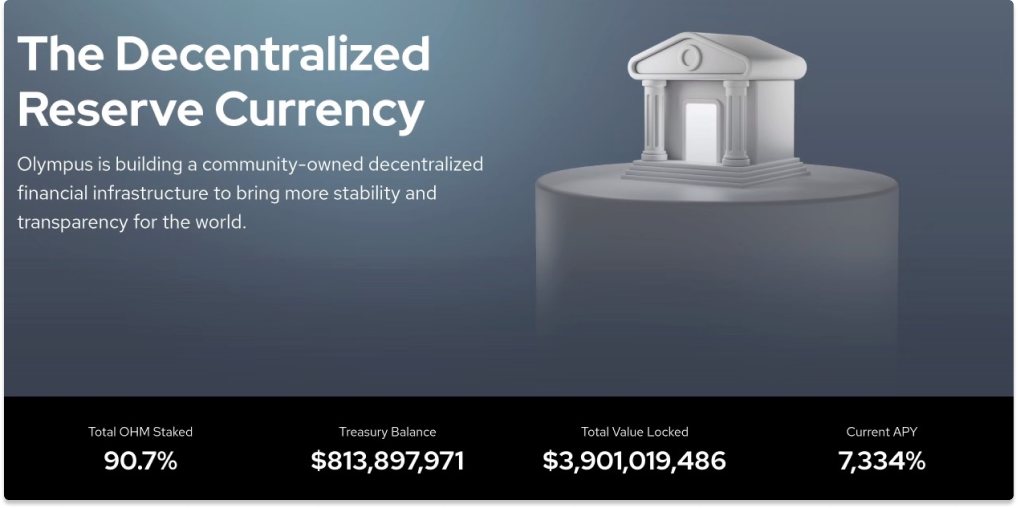Not Boring by Packy McCormick - Idea Legos
Welcome to the 2,079 newly Not Boring people who have joined us since last Monday (exactly the same growth as last week)! Join 88,087 smart, curious folks by subscribing here: 🎧 To get this essay straight in your ears: listen on Spotify or Apple Podcasts (shortly) Today’s Not Boring is brought to you by… Rows You know I’m bullish on all things web3 - NFTs, Solana, ETH. But let's face it: behind every crypto project, blockchain and DAO there is basically a spreadsheet with a list of transactions, customers, reports, and product roadmaps. Rows reinvented what spreadsheets can do. In March, I wrote that Excel Never Dies. I may have spoken too soon. Rows very much wants Excel to die. It has a shot: it’s one of the most “Holy shit 🤯” new product experiences I’ve had in a long time. Rows is a spreadsheet powered by APIs. They built 50 integrations with services like Google Analytics, Twitter, Stripe, Salesforce, even your custom APIs - and public databases like Crunchbase or LinkedIn. All to build gorgeous reports that update automatically, enrich leads faster and much more, right in the spreadsheet. Plus, Rows lets you publish spreadsheets as web apps for others to see and interact with your data, but without access to the setup and formulas. Anyone can make their spreadsheet interactive with buttons, date pickers, charts, and use it to build forms, models, and internal tools. All with no code. They even built me a Not Boring startup portfolio to showcase it. It’s kind of like if Excel, Airtable, Zapier and a BI tool had a baby, plus access to databases that normally live behind paywalls. It’s a no-brainer. Hi friends 👋, Happy Monday! It’s a short week so I’m going to keep this one short. Hopefully it helps you explain the magic of everything going on out there to your family just a little bit better. Let’s get to it. Idea LegosIdeas can build on each other like legos, just like software. Ideas are composable. Composability is one of the key features of web3. Chris Dixon defined it as the “ability to mix and match software components like lego bricks” in a thread he kicked off with this analogy: “Composability is to software as compounding interest is to finance.” Compounding interest is just money building on itself. It’s math that, on a long enough time horizon, looks like magic. Every time you earn interest, that new interest starts earning interest, too. Take $100k, buy a bond at 6% interest (ah, the good ol’ days), sit back, and end up with $1 million in forty years. Compounding is an easily quantifiable concept that’s hard to internalize. We underestimate its power often. Composability is just software building on other software. Each new protocol or NFT is like a lego to snap into others. Each new combination becomes its own new lego block, until, a few interactions in, you end up with something exponentially more powerful than the original building blocks. That’s why Chris said composability is like compounding; Ideas can build on each other like legos, just like software. Ideas are composable. Composability is one of the key features of web3. Chris Dixon defined it as the “ability to mix and match software components like lego bricks” in a thread he kicked off with this analogy: “Composability is to software as compounding interest is to finance.” Compounding interest is just money building on itself. It’s math that, on a long enough time horizon, looks like magic. Every time you earn interest, that new interest starts earning interest, too. Take $100k, buy a bond at 6% interest (ah, the good ol’ days), sit back, and end up with $1 million in forty years. Compounding is an easily quantifiable concept that’s hard to internalize. We underestimate its power often. Composability is just software building on other software. Each new protocol or NFT is like a lego to be snapped into others. Each new combination becomes its own new lego block, until, a few interactions in, you end up with something exponentially more powerful than the original building blocks. That’s why Chris said composability is like compounding; Because software isn’t as cleanly quantifiable as money, it’s even harder to intuit the impact of composability than of compound interest. Examples help. Scalar Capital’s Linda Xie dove deep into the concept’s applicability to web3 in June, arguing that “Composability is Innovation.” Snap a Zora smart contract into a Mirror smart contract, for example, and you have an essay that turns into an NFT, funds the author’s work, and turns fans into owners. We’ve discussed composability in Not Boring, too, both as it directly relates to web3 and as it relates to tech more broadly. Last Monday, I told you about the launch of Composer, whose elegance is derived from users ability to “compose” building blocks into automated trading strategies called Symphonies. The product is composability. And on Thursday, I quoted Stytch’s Reed McGinley-Stempel on the power of APIs:
This isn’t a new phenomenon. Composability is the engine that drives open source software. Whether web3 protocols, APIs, or open source software, composability means building in such a way that the next builder can pick up where you left off, add their own twist, and leave the combined work for the next builder. That has implications beyond software. In August’s Compounding Crazy, I wrote that composability is the reason that human progress accelerates:
That idea was a riff on an idea from Tim Urban’s 2017 Wait But Why essay on Neuralink:
Urban’s is the most expansive view of composability I’ve come across, even though that’s not what he calls it, because he’s not talking web3 or software specifically, but about knowledge. Language made ideas composable. “Knowledge, when shared, becomes like a grand, collective, inter-generational collaboration.” Then technology -- from the printing press to the telegram to the phone to the internet to Twitter -- made it easier to connect to people and share knowledge. Ideas got bigger and better faster and faster. Ideas composed and compounded more quickly. If compound interest is easy to quantify but difficult to feel in your bones, and software composability is harder to quantify and even harder to intuit, idea composability is the hardest to measure and feel of all. When an engineer plugs in an API or web3 protocol, they’re making a conscious choice. When someone picks up and riffs on an idea, though, they might not even know that they’re doing it. If you want to pull this thread, you should read Questlove’s Creative Quest. My main takeaway is that creativity is remixing. Idea composability is underappreciated because it’s hard to measure and trace. But idea composability is one of the main contributors to all of the progress and speed we’re experiencing. Ideas are building on each other more quickly than ever before, too. We’ve only had access to the world’s knowledge at our fingertips for like twenty years. That’s practical knowledge -- like mathematical equations or SAFEs or lectures -- but it’s also inspirational knowledge -- whenever a person or group of people does something, the rest of humanity knows that thing is possible within minutes. It wouldn’t make any sense for that access to knowledge and inspiration not to result in progressively more spectacular results. On the inspirational side, the famous example is the four-minute mile. The mile world record dropped from 4:06.2 to 4:01.4 between 1942 and 1945, and then it stood unbroken for nine years. After Sir Roger Bannister broke the four-minute mile, the next person did it 46 days later. A year after that, three runners broke the four-minute mile in the same race. Bannister proved that humans could run a mile in under four minutes; other runners took that knowledge off the shelf and used to break it four minutes themselves. I remember reading a book a few years ago, I think it was The Rise of Superman, in which the author described a similar phenomenon in extreme sports like skateboarding. A particular trick would be impossible until it wasn’t, and then the next batch of skaters would build on top of that trick. That guy did a 720? Cool, the next guy will try to rip a 900. Importantly, unlike software, skateboarders can’t just plug in the other person’s 720 and snap another 180 on top. Skateboarding tricks aren’t technically composable. Each skater has to do the full thing themselves. But the proof that something is possible unlocks something that helps the next person go bigger. From there, 1080, then a 1260. 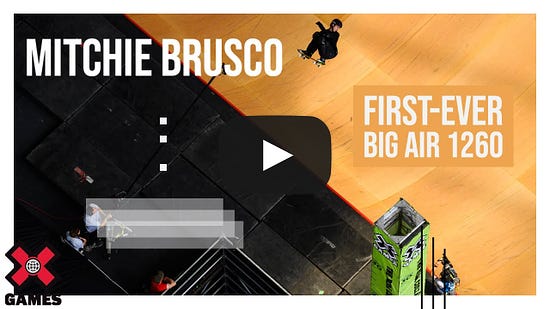 Things that seemed utterly impossible a decade ago are table stakes now. The same is true in the slice of the world that we cover here: startups and web3. The gap between idea and execution is shrinking. Composable software and composable ideas compound in parallel and feed off of each other. A new idea, built on a long chain of older ideas, can quickly combine with software that’s been composed of other software and go live within weeks or even days. That project gets to market quickly, teams up with memes and money, spreads, and its technical and conceptual components become new building blocks themselves, waiting to contribute to the next idea. If software composability alone is like traditional example of compounding interest is that bond that clips 6% every year, then the composability happening at the intersection of these parallelized compounding streams looks more like DeFi 2.0, in which people are staking their tokens to earn up to 0.9% every eight hours. Smaller, faster advancements compound on themselves quickly. That kind of rapid compounding produces very big results very quickly. Let’s get meta. DeFi 2.0 itself is a prime example of this phenomenon. Decentralized Finance (“DeFi”) exploded in popularity in 2020 during “DeFi Summer.” Total Value Locked grew from ~$1 billion on Memorial Day to ~$8 billion by Labor Day. DeFi 1.0 created a new opportunities for on-chain lending and borrowing, but also faced challenges, namely protocols’ ability to retain liquidity. In the beginning, they offer eye-poppingly high yields to convince people to stake and create liquidity, but once yields drop, the money goes away. It’s not loyal. So OlympusDAO launched in March this year, less than a year after DeFi Summer, with proposed solutions to common issues with DeFi, kicking off DeFi 2.0. The TL;DR is that DeFi 2.0 protocols own their liquidity instead of renting it. Olympus isn’t composed of DeFi 1.0 software as much as it’s composed of DeFi 1.0 ideas, game theory, and market understanding of DeFi. Offering 7,000% APY seems less scammy once people are used to very high DeFi yields. Since March, Olympus itself has become a building block, spawning a new generation of offshoots like Klima that compose Olympus’ DeFi lego, using Olympus Pro, but also its idea lego, namely: what happens when you create a black hole for certain types of assets using bonding and staking. (We’ll have to do a piece on these soon to explain, but for now, focus less on the details and more on the process.) To read about Klima and ConstitutionDAO as idea legos…How did you like this week’s Not Boring? Your feedback helps me make this great. Loved | Great | Good | Meh | Bad Thanks for reading and see you on Thursday, Packy If you liked this post from Not Boring by Packy McCormick, why not share it? |
Older messages
Stytch: Kill the Password
Thursday, November 18, 2021
Announcing the Newest API-First Unicorn Saving the Internet
Let's Buy the US Constitution
Monday, November 15, 2021
ConstitutionDAO, web3, and America
Modern Treasury: The Quadrillion $ Quest
Thursday, November 11, 2021
The $2 billion, 3-year-old Startup Modernizing Money Movement
Discord: Imagine a Place
Monday, November 8, 2021
A Not Boring x The Generalist Collab on the Internet's New Home
Rivian: The Most Remarkable Adventure
Thursday, November 4, 2021
A Deep Dive Into the 12-year-old, Amazon-backed, EV Adventure Company
You Might Also Like
🔮 $320B investments by Meta, Amazon, & Google!
Friday, February 14, 2025
🧠 AI is exploding already!
✍🏼 Why founders are using Playbookz
Friday, February 14, 2025
Busy founders are using Playbookz build ultra profitable personal brands
Is AI going to help or hurt your SEO?
Friday, February 14, 2025
Everyone is talking about how AI is changing SEO, but what you should be asking is how you can change your SEO game with AI. Join me and my team on Tuesday, February 18, for a live webinar where we
Our marketing playbook revealed
Friday, February 14, 2025
Today's Guide to the Marketing Jungle from Social Media Examiner... Presented by social-media-marketing-world-logo It's National Cribbage Day, Reader... Don't get skunked! In today's
Connect one-on-one with programmatic marketing leaders
Friday, February 14, 2025
Enhanced networking at Digiday events
Outsmart Your SaaS Competitors with These SEO Strategies 🚀
Friday, February 14, 2025
SEO Tip #76
Temu and Shein's Dominance Is Over [Roundup]
Friday, February 14, 2025
Hey Reader, Is the removal of the de minimis threshold a win for e-commerce sellers? With Chinese marketplaces like Shein and Temu taking advantage of this threshold, does the removal mean consumers
"Agencies are dying."
Friday, February 14, 2025
What this means for your agency and how to navigate the shift ͏ ͏ ͏ ͏ ͏ ͏ ͏ ͏ ͏ ͏ ͏ ͏ ͏ ͏ ͏ ͏ ͏ ͏ ͏ ͏ ͏ ͏ ͏ ͏ ͏ ͏ ͏ ͏ ͏ ͏ ͏ ͏ ͏ ͏ ͏ ͏ ͏ ͏ ͏ ͏ ͏ ͏ ͏ ͏ ͏ ͏
Is GEO replacing SEO?
Friday, February 14, 2025
Generative Engine Optimization (GEO) is here, and Search Engine Optimization (SEO) is under threat. But what is GEO? What does it involve? And what is in store for businesses that rely on SEO to drive
🌁#87: Why DeepResearch Should Be Your New Hire
Friday, February 14, 2025
– this new agent from OpenAI is mind blowing and – I can't believe I say that – worth $200/month
